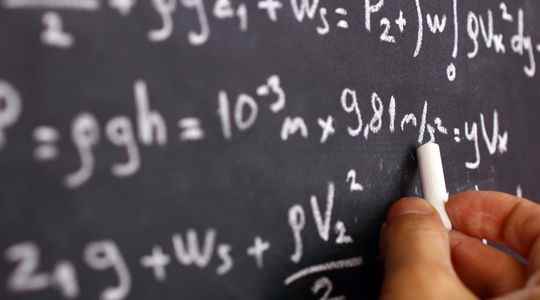It had been a dream for a long time. After years of caring for her patients as a nurse’s aide, Kadidia would have seen herself putting on a nurse’s gown. But to achieve her goal and pass the competition, this energetic mother had no choice but to come to terms with a dreaded subject from high school benches: Mathematics. “It wasn’t even an upgrade that I needed, but just a level,” jokes the 30-year-old, well aware of her difficulties. In her daily life, she assumes without taboo to use the calculator of her smartphone for the slightest addition, to have trouble understanding percentages, and even “not to understand everything” in the calculations of her mortgage. “I stopped at baccalaureate level, and after some time, even simple calculations became complicated”, she explains, even though the nursing competition requires solid knowledge in divisions, fractions, dose calculations or percentages. .
More than ten years after leaving school, Kadidia therefore decided to resume maths lessons. Just before the Covid, she joined the Philotechnique association, which specializes in providing education for adults. For 45 euros a year, she rediscovers the joy of equations and problems with multiple unknowns. With confinement, the caregiver even has the chance to take a course by videoconference, one-on-one with a teacher. “I found all my basics, he sent me dozens of exercises to repeat again and again, sent me the answers, analyzed everything I hadn’t understood… It was a huge advantage” , says Kadidia. A few months later, she will learn that the written competition is canceled due to Covid, and that there will be no oral math. “I didn’t get it in the end, but my refresher in maths clearly helps me in everyday life. When I shop during the sales, I practice mentally to see if I’m getting tricked or not, and everything is clearer!”.
“A real renewed interest”
Kadidia’s case, far from being unique, motivates Marie Lattuati every day to exercise her activity as a mathematics teacher. At 78, this retiree from National Education continues, with her husband Vincent, to teach voluntarily at the Philotechnique association, where they met the caregiver. Each year, they welcome in their various courses a dozen students, all adults, anxious to find “a high school level or more” in mathematics. “There are a lot of people in professional retraining who want to take a competition for which maths is compulsory”, confides Marie, who has thus seen multiple candidates for the diploma of access to university studies (DAEU), to the teacher competition. schools, a nurse, or even a museum guard. Some years, the professor also sees elderly people arriving in her class, who come “to have fun or to exercise their logic”.
This is the case of Geneviève, a 78-year-old retiree. At school, this writer remembers having always preferred French or foreign language lessons. But after years without exercising her knowledge of math, the Parisian wanted to “test herself” with the evening classes of Marie and Vincent. “It was not easy, you really have to work to find your level,” she admits, laughing. Despite the difficulties, Geneviève rigorously learned her lessons each week, completing the exercises sent by the couple and learning new methods of calculation. “Training my logical reflexes, I really enjoyed it. And in everyday life, the lessons have greatly improved my attention and my memory”.
“Seniors like the intellectual gymnastics required by math, concentration, repetition… We have a lot of requests in this direction, it’s a small trend”, analyzes Wilfried Garnier, founder of the networking platform between students and teachers Superprof. Since the Covid pandemic and the confinements that followed it, the director has also observed a “real renewed interest in the subject among adults”: in two years, the number of requests for courses for those over 30 is thus increased from 15 to 25% on its site. “With the Covid, there was a kind of awareness. We have people who wanted to resume their studies, find a level, feel capable of helping their children prepare for the baccalaureate… It’s a real challenge.”
“Maths shouldn’t cause anxiety”
“Maths are lost. If you don’t practice them for five years, you have to go back to a lot of basics… But there is no hopeless case”, analyzes Eric Pruvost, researcher in artificial intelligence and professor especially mathematics. After giving lessons to adults in retraining who wanted to go back to school and become scientists, engineers or even airline pilots, the teacher is categorical. “For all the people I dealt with, the blockage was the same: they did not have confidence in themselves”. Almost every time he meets, he hears forty-somethings tell him, slightly ashamed, that they have always been “bad at math”. “But it’s a negative belief! We’re not bad or strong at math, it’s just a question of method and training. Anyone can find the level,” he insists.
To share his passion with as many people as possible, the professor even launched his YouTube channel in 2016, combining courses, exercises and historical analyzes on mathematics. “It changes teachers who squeak their chalk on the board going at full speed, and those who popularize the subject so much that we no longer understand anything”, he argues. Success quickly exceeded his expectations: in six years, his channel had managed to attract more than 63,000 subscribers, including many adults. Regularly, the teacher thus receives warm comments from users reconciled with maths. “Once, one of them told me that he had understood in five minutes what we had tried to explain to him for four hours. Another assured me that my videos made him want to redo math in adulthood… It motivates, and it shows that you can completely unlock this feeling of being ‘dumb’. Even years later”. Delighted with the new teaching methods in this area, Marie Lattuati agrees. “I think the fun of doing math is as important as the course itself, and maybe that’s what some teachers should remember. Math shouldn’t lead to anxiety, fear or blockage” .
